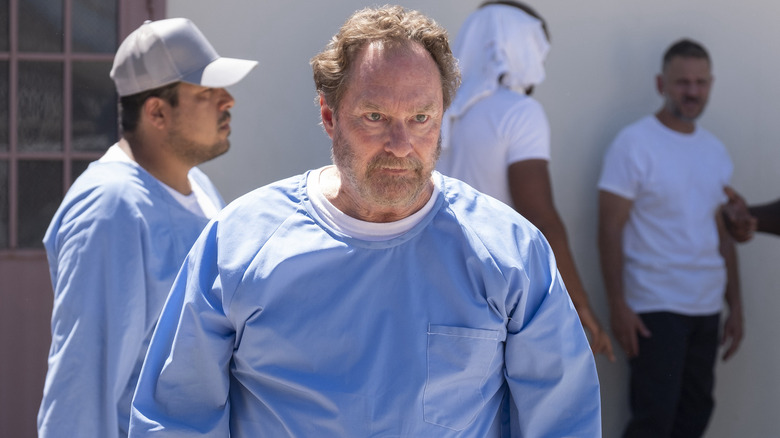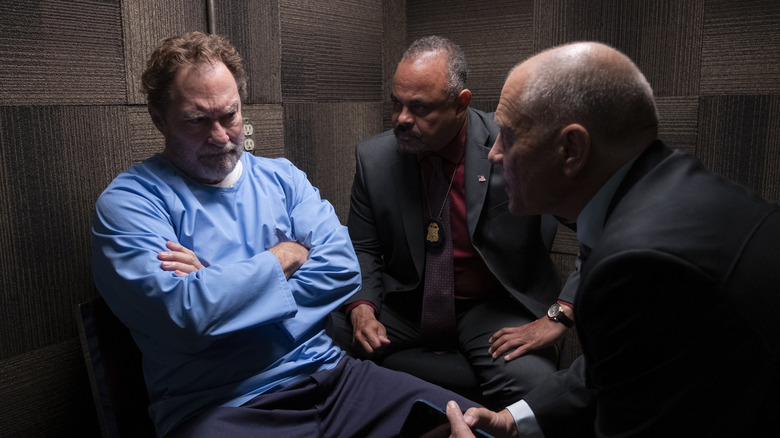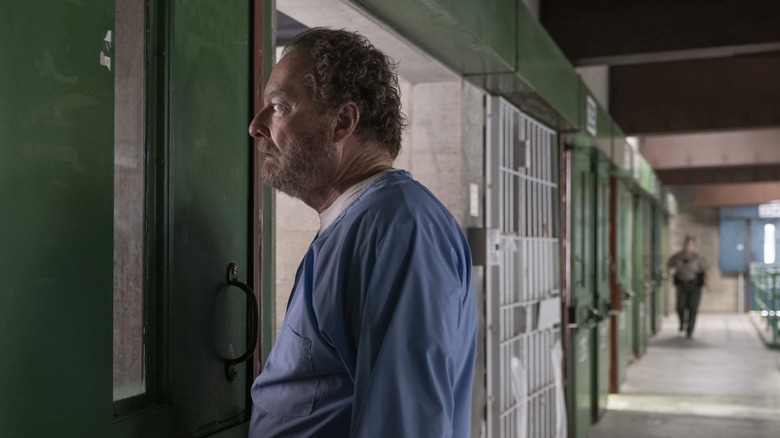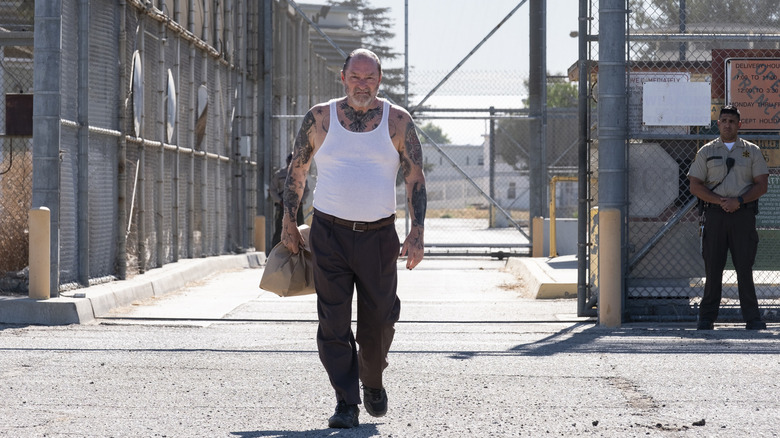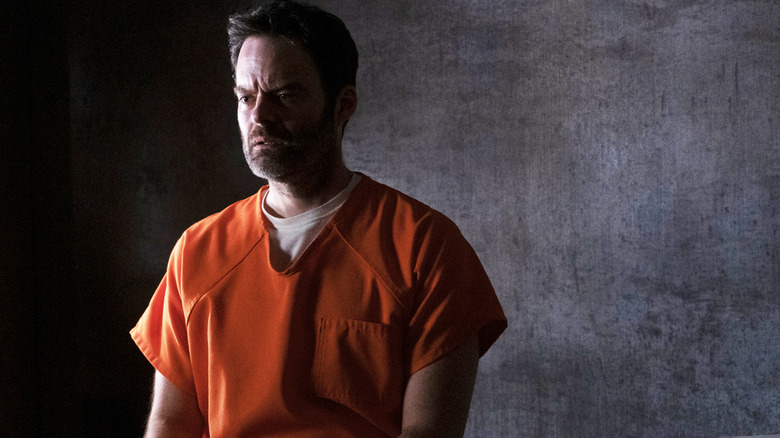Barry's Stephen Root On Fuches' 'Transformational' Moment, The Raven, And More [Exclusive Interview]
This post contains spoilers for "Barry" season 4 episode 7, "a nice meal".
Monroe Fuches has long been one of the most manipulative, slimiest characters on television, but in season 4 of "Barry," the ever-scheming criminal has been through the wringer. After flip-flopping on his allegiance to Barry (yet again) early in the season while in prison, a legendary beating ends up giving him some serious clout inside those concrete walls. With that newfound power, he fully adopts the fictional Raven persona invented in previous seasons, and after a surprising time jump, he's finally out and ready for revenge — this time with his own gang at his disposal.
I caught up with legendary character actor Stephen Root over Zoom to talk about Fuches' big transformation, finding the humanity inside of this terrible person, being directed by Bill Hader, and more.
Note: This interview has been lightly edited for clarity and brevity.
'I think it is a transformational moment for the character'
Fuches has gotten beaten down in a multitude of ways over the course of this series, but the beating that he takes in the prison feels like one of the worst yet for him.
[laughs] Yes.
Did you view that scene as a rebirth or sort of transformational moment for the character?
I think it is a transformational moment for the character. What was interesting was that I think it was originally, you were going to find me already seated with all these prisoners. And Bill said, "No. I think it's going to be better if we walk you in." So, as an actor, you have to be ready to do stuff on the fly. So it was interesting to create that walk and get there and do all the physical manifestations that somebody who'd gotten the s*** beat out of him can do. So I loved being able to do that.
But yeah, at the end of that, of course, he gains so much confidence, because now this whole prison population is following him. He comes in, he [notices] nobody's doing anything, takes a bite, and then everybody else takes a bite. He realizes that he has an enormous amount of respect now, and can actually have some power within the prison. So I think that continues to develop and grow and grow, and the tattoos grow, and the confidence grows. So by the time you see him seven years later, he has control of that prison. He has control of himself, and he's going out into the world.
'We're putting that bullseye right on my neck'
You get some new shades to play, especially after adopting that Raven persona. Is there a scene or moment that stands out as being particularly memorable for you playing that version of Fuches?
Well, the first time we did it was the entrance of him through the bars. I think to be able to really do that first was helpful to be able to play the character later. Because Bill decided whenever I was in camera as the Raven, he wanted a very still character. So you had to create a walk that was very stately, somebody who knew exactly what they were doing. And when you see the Raven in future scenes, it's stillness that grabs you. It's like, "What is he going to do next?" That's Bill creating that through being very still, with the camera and with my movements. So it was helpful to be able to do that first.
Were you able to have any input on the tattoos at all?
I was. Corey [Castellano], our fantastic make-up artist, created all of them. But he created a multitude of things, and I got to do a couple of things that maybe I wanted that he had overlooked. He had a small one and said, "I don't think we're going to use this." I said, "What is it?" He said, "It's a bullseye." I said, "Oh, no. We're using that. We're putting that bullseye right on my neck to basically signify my whole life. There's a red dot on the back of my head my whole life. We're putting that right there." It made a difference just — even though I couldn't see it, it made a difference that was there.
'I thought that was a much better solution'
Fuches is often miserable and does horrible things in the show, but occasionally, the audience finds itself liking him against all odds. How did you manage to maintain the character's humanity in your performance? Is that something that you actively thought about while playing the role at all?
Well, I knew the side of him that truly, really and truly loved Barry had to come out every once in a while. So yeah, I would think about it. But it's really dictated by what's needed in the scene. If what's needed in the scene is sympathy for that character, then I'll draw on that love that he had for Barry. So I did think about it, but not overly. I didn't want him to be a sympathetic character, but I wanted you to have sympathy for him every once in a while.
Do you recall any scenes in season 4 that were maybe tougher to get through but ended up being slightly reworked, and ultimately ended up working out?
Yeah. There's a scene where the two guys that I've picked to be my gang are — I'm sitting there just feeling down, and they really hit on me. "What are you doing, Fish Tits?" [laughs] Whatever the stuff they call me. Then, I call Barry later and say, "This is very hurtful to me." That did not start out to be that scene. That scene, after they do all those insults, in what we shot earlier that day, was him turning and screaming at them saying, "No, I'm a good guy. What the f***'s wrong with you? I'm a good guy," and I do all this stuff and I have a long monologue leading to a cell where I go in.
But ultimately, when Bill saw it, he said, "That doesn't really work, so I'm going to cut it after the guys start berating you, and then we're going to go to the jail cell for the call." Then we added some ADR in that call to make that work. I thought that was a much better solution than turning on them and saying, "No, I'm not." It made you feel sorry for him.
'I think he takes bigger swings at things'
You mentioned Bill's ability to maneuver things and think on his feet really quick, and then change things in the moment. From the outside looking in, "Barry" is one of the best directed shows on television, and he directed every episode of the season. You've been working with him for a long time now. What is it about him as a director that stands out to you?
That he can speak intelligently to every aspect of the production, from the cinematographer down to the tiniest bit of costume that he feels should happen. He's a good communicator with every department head, and that's what makes a good director, is good communication with different aspects of the show. And the fact that he's an actor and he can talk to actors. He can talk to actors in short speak and say, "You remember when you did...? Do that." You don't have to give me a half an hour of what my motivation is. It's just, "Remember that?" "Yeah. Oh, I see what you're talking about." "Go." So it saves a lot of time, and you appreciate it that he's a fantastic actor, and he can quickly get to you as a director what he wants to say.
Have you noticed an evolution of him as a filmmaker, as a director, over the course of the show? It seemed like he really leveled up in season 4. Were there any particular things you noticed him doing differently?
I think he takes bigger swings at things. Like the sand thing. That's a big swing. That could be a show ruiner if it didn't come off right. So I think he's brave enough to take big swings that work. Doing a chase scene and there's no CGI in it. There's just real people doing real stunts. That makes a big difference. As an audience member, you're going, "Oh, that guy can get f***ing killed easily." You know? So I think his ability to take big swings and succeed is what he got later on in the series.
"Barry" season 4 airs Sunday nights on HBO.
